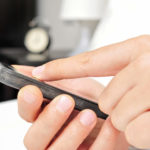Have you recently enjoyed a quiet Saturday evening on your back porch gazing at the stars, pondering the universe in peaceful solitude? Have you taken a moment to stop thinking and working just to relax? Was your smartphone by your side or in your pocket during this stress-free moment? If so, you still may have been working at nanospeed thanks to the omnipresence of mHealth.
mHealth, or mobile Health, is also called pHealth or uHealth for pervasive Health and ubiquitous Health because it is all of those things. mHealth includes health text messaging, mobile phone apps and remote monitoring with portable sensors. There are high hopes for mHealth to provide positive disruption to healthcare delivery by reducing health risk, optimizing health outcomes, increasing personal health responsibility, supporting disease prevention, and reducing healthcare costs.
Yes, there’s an app for that
mHealth, of course, must be mobile, and that’s where your health meets your smartphone. Your ubiquitous phone can be your partner in health, if not your partner in healthcare. Just consider the apps at your fingertips today for weight loss and fitness. The groundbreaking Weight Watcher’s app is feeling the skinfold pinch from MyFitnessPal and FitBitOne with over 40 million users reported to be using these apps to monitor food intake and daily exercise. A Pew Research poll in 2012 revealed that over 20% of smartphone users have a health app on their phone.1
Experts suggest that we may be at the “tipping point” with health apps, as devices become smaller and processing speeds become faster. Today, people don’t even have to enter data; the device captures data directly. While you are stargazing or sleeping, your smartphone or wireless activity tracker (like iWatch or Fitbit Zip) are hard at work capturing data about your location, your body and your environment. These sensing devices are continuously collecting data that, as the Fitbit team says, “motivates you to stay active, live better, and reach your goals.”
Patient-centered healthcare delivery
This brings us to the disruptive technology opportunity for mHealth: the hope that these personal devices will engage and empower people to take charge of their healthcare in new ways. mHealth devices may be one of the most important innovations in creating a truly patient-centered healthcare delivery model. These devices may improve patient and provider communication, support patient home health monitoring, and improve patient daily decision making about healthy lifestyles and treatment compliance.
Today, Health and Human Services (HHS) is fostering emerging mHealth strategies. The National Cancer Institute is managing the Smoke Free TXT program for smoking cessation. Health Resources and Services Administration (HRSA) has launched TXT4TOTs which provides American Academy of Pediatrics guideline-based nutrition and physical activity information to caregivers of young children. HHS and the White House are sponsoring the “Apps Against Abuse” competition to encourage the development of smartphone apps to allow real-time communication between an endangered young adult and a trusted friend to prevent abuse or violence.
The data challenges
While all of this mHealth activity seems beneficial, there are some concerns. For example, technology may be way ahead of understanding the quality and/or benefit of some health apps. These days it seems like what can be measured will be measured whether or not it is accurate or beneficial. In addition, these devices are creating monstrous amounts of data, with complex issues of data storage and secure data transfer to a healthcare provider. mHealth devices may collect data that will need to partner with eHealth solutions for private and safe storage and delivery.
Certainly people seem to be engaged with healthcare-related apps, with tens of thousands of apps available on iTunes, Amazon, and Google. Privacy is not an issue for some people and apps are used to share health, exercise, and fitness information voluntarily on social media sites. For some people sharing this information creates accountability and competition-motivated improvement…the Facebook version of the Biggest Loser.
Meaningful applications ahead
The use of mHealth devices for true healthcare purposes will be much more serious business. One example of this is the iBGStar iPhone glucose meter. This FDA approved mHealth device monitors glucose, insulin, and carbs. This personal health data is captured in an app that provides visualization of glucose trends. The app also facilitates communication of this data to a healthcare provider, meeting all of the safeguards of protected health information.
Are you using an mHealth device? Are your patients using mHealth devices and apps? Can these devices empower and engage patients and be a building block for patient-centered healthcare delivery? Next time you’re stretched out on your lawn chair, whip out your IPhone and post a comment on the Acumen blog about mHealth and your pulse.
1. Pew Internet & American Life Project. http://www.pewinternet.org/Reports/2012/Mobile-Health/Key-Findings.aspx. Accessed Sept. 29, 2013.




Leave a Reply